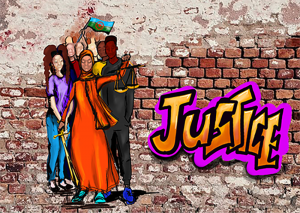
On 25 February 2021 JUSTICE published Tackling Racial Injustice: Children and the Youth Justice System, chaired by Sandra Paul.
At most stages of the youth justice system – from arrest to custody – the proportion of Black and Minority Ethnic (BAME) young people is higher than the proportion of white young people. This disproportionality can be seen at its starkest in the youth custodial estate, where the BAME population is 51%, despite being 18% of the 10-17 year old population. The rise in proportion of BAME young people in the youth secure estate (YSE) has coincided with a drop in the number of young people within the YSE. The under-18 secure population peaked in October 2002, with the number of incarcerated young people at 3,200.
Since then the number of young people within the YSE has gradually declined, with only 835 being held in November 2018. The majority of this decline is a result of a reduction in white young people being held in the secure estate. This pattern – a reduction in the total number of young people at each stage of the youth justice system being driven primarily by a reduction of white young people – is reflected in other stages of the youth justice system. However, the continuing presence of BAME young people in the YJS is causing increasing racial disparities.
JUSTICE has convened a Working Party to explore the reasons why disproportionality is occurring in the youth justice system, with a view to making positive recommendations for change and reducing racial disparities in the youth justice system.
This Working Party examined the causes of BAME disproportionality in the Youth Justice System (YJS) of England and Wales. It made practical recommendations with a view to reducing that disproportionality. In addition, it sought to ensure that children are not needlessly criminalised by improving the attitudes, processes and procedures in the YJS.
The members of the Working Party are:
Sandra Paul (chair) (Partner at Kingsley Napley)
Sam Cottman, Director of Pro Bono, Travers Smith LLP
Garry Green (Subgroup Chair), Doughty Street Chambers
Maya Sikand KC (Subgroup Chair), Recorder and Barrister, Doughty Street Chambers
Mehran Behvandi (First Tier Tribunal Judge and Solicitor)
Kate Aubrey-Johnson (co-author of Youth Justice Law and Practice Handbook and Barrister, Garden Court Chambers)
Pippa Goodfellow (Director, Standing Committee for Youth Justice)
Millicent Grant (former president of CILEx and JUSTICE council member)
N. Lynn Hiestand (former partner of Skadden, Arps, Slate, Meagher & Flom LLP and JUSTICE board member)
Dr Laura Janes ( Legal Director at Howard League for Penal Reform
Jude Lanchin (Solicitor, Bindmans)
Samantha Magness (Head of Policy and Inclusion, Crown Prosecution Service)
Danielle Manson (Barrister, Garden Court Chambers)
Adam Mooney (Programme Manager, disproportionality, Youth Justice Board)
Katya Moran (Co-Head Youth Justice Legal Centre)
Naomi Redhouse (Observer), District Judge)
Tariq Desai (Rapporteur)
The members of the sub group are:
Amal Ali (Policy Officer, the Criminal Justice Alliance)
Claire Sands (Research and Policy Manager, the Howard League for Penal Reform)
Kimberley Lamb (Director of Bedfordshire Violence and Exploitation Reduction Unit)
We are very grateful to the Barrow Cadbury Trust, and the Blagrave Trust, and Travers Smith LLP, who supported the Working Party. We are extremely grateful to JUSTICE’s new Criminal Justice Lawyer, Tyrone Steele, who assisted in drafting the report.
Having sat since October 2019, the Working Party has made 45 recommendations which seek to increase decision-makers’ understanding of the child appearing before them. In doing so, the aim is to eradicate, and if not, minimise, the bias, suspicion and misperception that pervades discriminatory exercise of power so as to meet BAME communities’ expectations of fair and impartial treatment at each stage of, and interaction with, the criminal justice system.
Key recommendations include:
Suspending blanket use of ‘section 60’ stop and search powers for serious violence in a locality, until the Home Office has evaluated its impact and effectiveness;
Abolishing the ‘Gangs Violence Matrix’, which indiscriminately includes thousands of BAME children and young adults, threatening their access to education and jobs;
Preventing the unfair use of Drill music as bad character evidence in court, to tackle the corrosive effect of portraying a genre of music as innately illegal, dangerous and problematic;
Creating a national framework for diversion, to ensure children everywhere can receive specialist support not prosecution;
Expanding initiatives that give children a voice, through access to translators where there is a language barrier, as well as other innovative methods.
Enforcing mandatory specialist child-focused training for lawyers, as well as high-standard cultural competency training for all criminal justice agencies, so that all those who work with children are able to do so effectively;
Urgently improving information available to magistrates at bail hearings, so that remand in custody is significantly reduced;
Requiring all complaints concerning children to be investigated by the Independent Office for Police Conduct; and
Mandating the police turn on their body worn video cameras before every stop and search, so that improper conduct is prevented or caught.
These changes will help to build a child-first approach into the justice system, with sources of bias and discrimination addressed through changes to policy, institutional culture, and practices. While no one report can undo years of structural racism, we hope to support the continued efforts of communities seeking equal justice.
Read the full report here (PDF-version available here)
